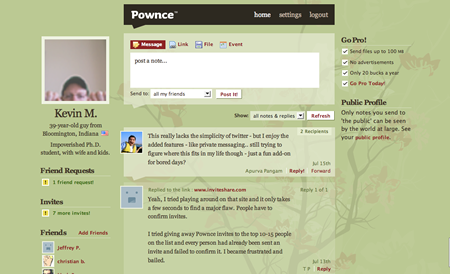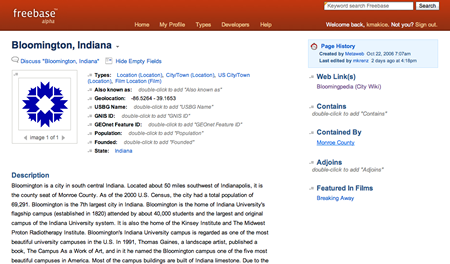For anyone who is interested in trying out Pownce, Freebase, or Spock, I have several invites available for each. Post a comment or contact me off blog to request one. This offer is open to any BlogSchmog reader, but specifically it is aimed at Bloomington IT and School of Informatics folk who want to explore a year-long development project to benefit the local community.
Pownce
Leah Culver described her personal project on her blog when it was released last month. The buzz was generally positive about this cleanly designed tool to create a personal data stream. It has the status and ephemeral discussion of Twitter with special channels for links and shared resources. As pretty as the site is, though, the integration with my life is lacking. I have to go to the Pownce site to get any value. There is currently no API (although that will change soon) so the only desktop tool is a nice-looking AIR application that lacks all of the grace of Twitterrific. There is no RSS support, which means the parts of my data stream have to be assembled manually and posted, if I want to use Pownce as both a broadcast and alert medium. The pedigree of its creators will all but guarantee that Pownce will be around for a while, but at the moment the service is making me do too much of the work.

Pownce has promise, but makes me go too far out of my way to benefit my life.
Freebase
I already covered this in a post last week (), but it bears repeating that this open structure database has great potential to be a bridging tool for managing collective knowledge. The site is wiki-like in that anyone can come in and edit content—well, anyone with an invite, and I’ve got 10 to give at the moment—but the content is presented in a structured way. The information is encapsulated in a data form, making it easy to use the MetaWeb API and find a myriad of application uses for it. Freebase is just one implementation of MetaWeb.

To interact with Freebase, you will need an account.
Spock
Our personal proliferation of online identities—every new site or community requires a new username-password account—is a big problem. So is the fact that people often share names with other humans or things. Search for a person can become a long process of wading through irrelevant pages when what you want most is a simple bio. For academics and technology gurus who are more inclined to self-publish their own biography page on the web, it is a reasonable task. By try looking for a biography on some local artist who happens to be named Michael Jackson. There is also a little widget to allow the aggregated content to be included in a blog. Spock is a new search tool that relies on the community to build relational information about the common folk while leveraging some categorization formulas to extract reasonable summaries about the celebrities.

When people share the same name, it can be confusing. Spock can differentiate the Spocks.
Invites … Invites … get ’em while they’re hot.
6 replies on “Invitation to Web 2.0”
Would love a Pownce invitation if you have one.
thanks!
hi Kevin,
Most probably you know about this (meetup.com) it is a more targeted kind of social networking. It brings ppl “out in open”. I don’t think there is much activity in Bloomington zone. But, I thought you might find it interesting because you are involved in local-social development (I think I made up that word, :P) and it might come in handy for the un-conferences. (with all due respects to critical mass)
The problem with MeetUp is that it is only free to browse. You have to subscribe in order to post any MeetUp suggestions. That happened in the year after extensive use by Howard Dean (and Dennis Kucinich) to create MeetUp political fundraising groups. MoveOn has helped scratch that particular itch for the Democrats by facilitating local events, but for other things the fact that someone has to pay to enter an event makes it a barrier.
Evil Spock isn’t a top search on Spock?!? Preposterous!
I sent you an invite, creating a little profile for Evil Spock as well. Enjoy!
[…] 23:12:20 Pownce « Wrathchild 2007-07-27 19:53:02 BlogSchmog » Invitation to Web 2.0 2007-07-29 06:24:48 Interview with Leah Culver: The Making of Pownce […]